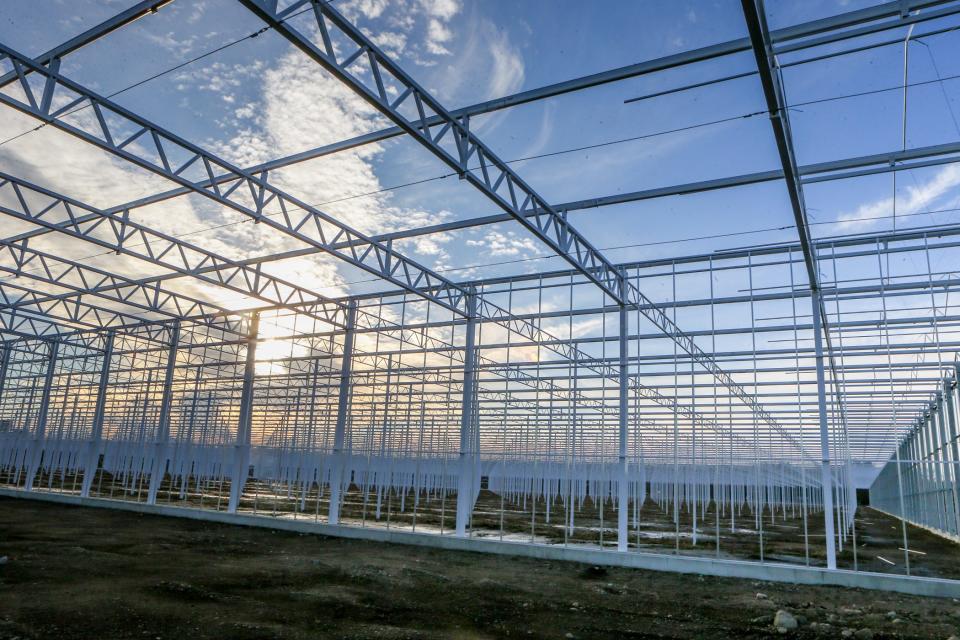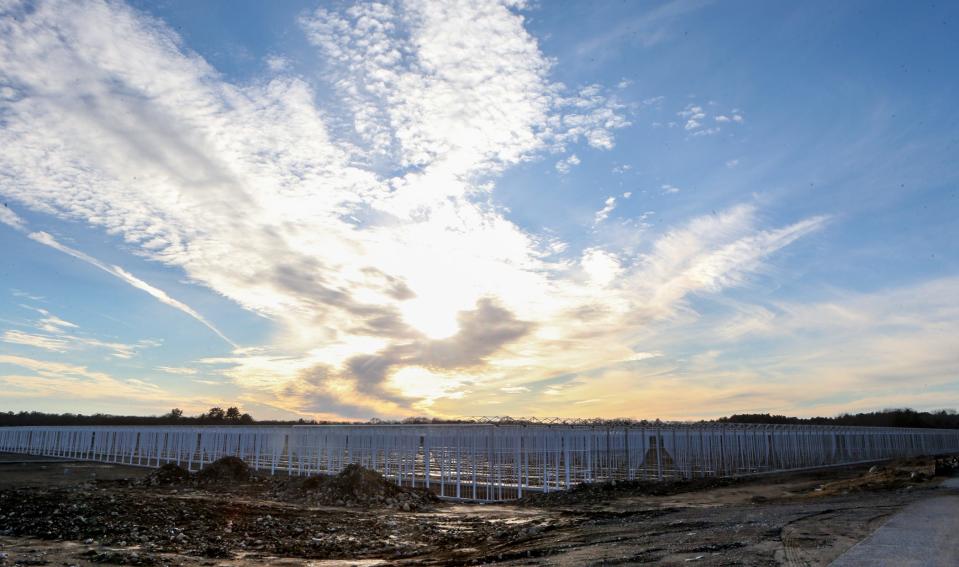Will this mall-sized greenhouse ever grow tomatoes? Schartner's project still in the weeds.
EXETER – Three years after portions of its gargantuan, 25-acre metal skeleton first rose over a local farm field, construction of the Schartner greenhouse project has yet to resume as the company confronts several local requirements, town officials say.
The town zoning inspector last year lifted the cease-and-desist order he imposed after farmer Tim Schartner and his partners in Rhode Island Grows LLC moved ahead with the project off Route 2 without local zoning and planning approval.
They had argued in court, unsuccessfully, that despite its mall-size footprint, the structure fit the definition of a greenhouse, allowing them certain agricultural exemptions from zoning review.
The lifted cease-and-desist order came with conditions: Construction could not resume until the project met town planning and zoning requirements, and one major stipulation is that the three parcels of land it sits on must merge under one ownership.
That has yet to happen, as that land consolidation is now in probate court.
“The biggest holdup is the project has to be on one parcel, and currently that is in probate,”’ said Planning Board Chairman Scott Millar. “One of the Schartner family members owns one of the parcels and that has to get deeded over to this particular project.”
“It’s a massive project, and you don’t want it to be on different parcels with two ownerships,” said Millar. “That would just create another layer of uncertainty.”

Project could move forward despite town's concerns about water use
Patrick Sweeney, a spokesman for Rhode Island Grows, said in a statement Wednesday that “the town has granted us an allowance to move forward until probate is resolved, which should be soon. That was always our intent, as the town knows.”
There are other concerns as well, said Millar.
“We’ve heard some preliminary testimony from our fire chief that he has some concerns that he can’t get access all around the building the way he’d like to in the event of a fire. So that is something that has to be worked out.”
Said Sweeney: “As far as access, our fire and life safety expert has addressed issues of egress and ingress and is currently working with both the town and state fire marshals.”
Town officials also have questions about how much water the project would draw from the underground aquifer, said Millar.
Tim Schartner told The Journal in 2021 that his hydroponic greenhouse – Rhode Island’s first large “controlled environment agriculture” project – would grow two-story-tall tomato plants year-round while using less than 5% of the water necessary to grow tomatoes traditionally in soil.
Sweeney said Wednesday that the project “will not be drawing from the aquifer. We’ll collect nearly 100% of the rainwater that falls on the greenhouse and only use about 2% of the water otherwise used for a crop per pound.”
Could this greenhouse be the answer to the world's food demands?
Used in other states and countries, the large-scale hydroponic greenhouse technology is the future answer to the world’s food demands, scientists say.

Schartner has said his greenhouse would employ some 80 workers and produce a staggering 42,000 pounds of tomatoes a day, trucked and sold around the Northeast.
The project, he said, is also a way to save the remaining 225 acres of the family farm from development.
More: Farm or factory: Will Schartner's mall-sized greenhouse change RI town's rural character?
The Schartner greenhouse would be the first of several that Rhode Island Grows plans to operate in multiple communities. According to its company website, it wants to have 350 acres under glass within five years.
As to when the project might start growing tomatoes, that remains unclear.
Sweeney said that besides working with the town on various issues, Rhode Island Grows is also “finalizing our financing” for the project.
“Hopefully, this process will be complete within the next eight weeks,” Sweeney said.
Contact Tom Mooney at tmooney@providencejournal.com.
This article originally appeared on The Providence Journal: This mall-sized tomato greenhouse in RI is still on hold

